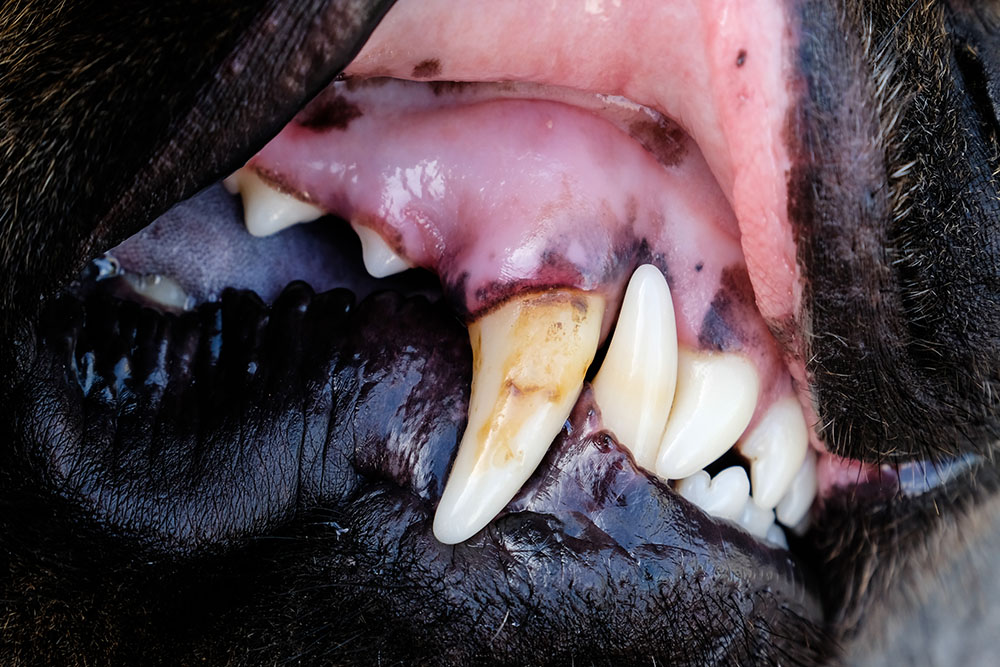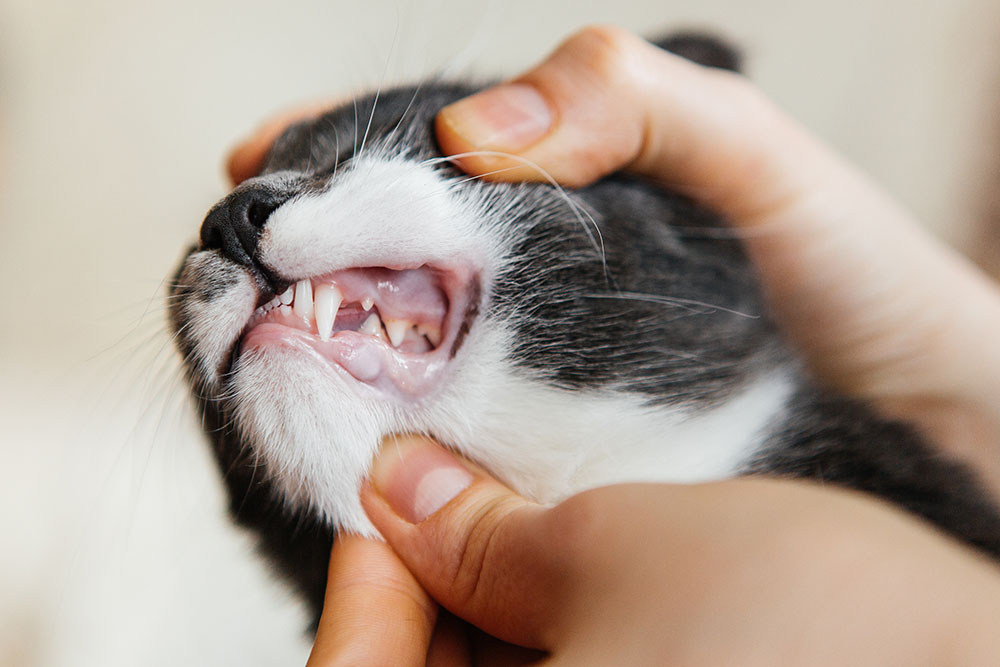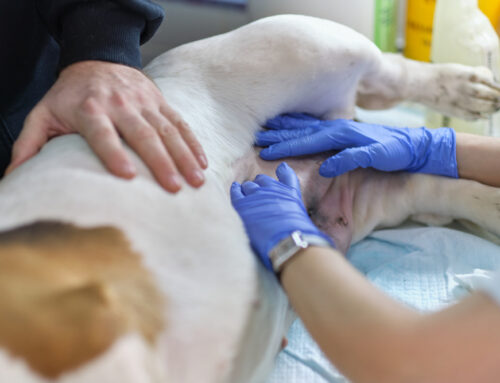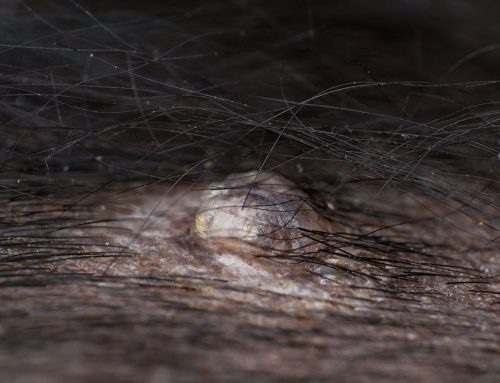From Tartar to Trauma: How Dental Neglect Leads to Pain and Bone Loss
Your dog may eat with enthusiasm and your cat may purr at dinner, but subtle signs- bad breath, avoiding crunchy food, or pawing at the mouth- can reveal significant pain beneath the surface. Dental disease in pets develops quietly but can have devastating effects, including infection, bone loss, fractured jaws, and even life-threatening sepsis.
At Creature Comforts Veterinary Service in Saylorsburg, PA, our AAHA-accredited team provides advanced dental exams, professional cleanings, and targeted treatments to prevent these serious outcomes and protect your pet’s long-term health.
Why Neglecting Pet Dental Care Is So Dangerous
Dental health is not cosmetic- it’s medical. The mouth is the entry point to the rest of the body, and bacteria that thrive in neglected teeth and gums can enter the bloodstream, spreading to the heart, liver, and kidneys.
Dental disease in pets is extremely common, with most dogs and cats developing periodontal disease by age three. When left untreated, minor gum irritation becomes deep infection, leading to bone destruction, pain, and systemic illness.
Skipping cleanings doesn’t save money- it postpones small, manageable issues until they turn into emergencies that are far more painful and expensive to treat.
The Domino Effect of Untreated Dental Disease
Dental disease always progresses. Plaque hardens into tartar, leading to gingivitis, then to periodontal disease, which destroys tissues that hold teeth in place. Once the infection spreads below the gumline, it causes bone loss, abscess formation, and chronic inflammation that affects the entire body.
What begins as a small fracture or loose tooth can escalate rapidly. A fractured tooth exposes the pulp cavity, allowing bacteria to enter and cause severe infection. Without prompt care, the infection may spread to the orbit behind the eye, forming a painful retrobulbar abscess that causes facial swelling, fever, and loss of appetite. In other cases, the infection eats through surrounding tissue, forming an oronasal or oroantral fistula– an abnormal opening between the mouth and nasal cavity that leads to chronic sneezing and discharge.
If periodontal infection continues unchecked, bone loss can become so severe that the jaw becomes brittle and breaks under normal chewing pressure. Jaw fractures are painful and often require surgery or wiring to repair. These injuries are especially common in small-breed dogs with fragile jaws.
In advanced cases, oral bacteria enter the bloodstream, leading to bacteremia and sepsis- conditions that can affect multiple organs and become life-threatening if not treated quickly.
Overlooked Oral Injuries and Their Consequences
Not all dental disease is caused by neglect- sometimes it’s trauma that goes untreated because symptoms are subtle.
Chewing hard items such as bones, antlers, or ice can crack teeth. When unnoticed, these fractures expose the pulp, causing slow infection that can destroy bone and tissue. Left untreated, fractures can lead to tooth loss, leaving open wounds that harbor bacteria. Over time, this infection can compromise neighboring teeth and even cause widespread abscessation.
Even small tumors or growths can be overlooked without regular exams. A benign oral mass may start small but can grow rapidly, invading the jaw and soft tissue, distorting the mouth, and preventing normal chewing. By the time the tumor is visible to an owner, it may have eroded bone or become inoperable.
Why Professional Cleanings Save Lives
True dental cleanings aren’t cosmetic- they’re lifesaving medical procedures.
Professional cleanings under anesthesia allow veterinarians to clean above and below the gumline, where disease begins. Anesthesia-free “cleanings” may make teeth look cleaner on the surface but miss hidden infection and cannot address the root cause of disease. They also prevent proper probing, X-rays, or safe treatment of painful areas.
A comprehensive dental cleaning at Creature Comforts includes:
- Full-mouth radiographs to evaluate tooth roots and jawbone health
- Scaling and polishing above and below the gumline to remove bacteria and tartar
- Periodontal probing to detect pockets of infection
- Extractions or treatment of diseased teeth when necessary
Advanced imaging identifies problems invisible to the eye. For instance, a tooth may look intact yet hide a deep root infection or early-stage bone loss. Dental X-rays are the only way to detect these hidden dangers early, before they cause permanent damage or painful complications.
What Happens When Cleanings Are Delayed
Delaying professional dental care allows infection to spread and intensify. Plaque becomes tartar, gums recede, and bacteria seep deeper into bone. The inflammation triggers immune responses that erode tissues, eventually destabilizing teeth. Once teeth are lost, bone loss accelerates further, reshaping the jaw and changing how pets chew and eat.
When enough bone support is gone, the jaw becomes fragile- just a small bump, bite, or toy tug can cause a mandibular fracture. Repairing these fractures often requires plates, wires, or prolonged jaw immobilization. Some pets never regain full function. Others may lose so much bone that normal chewing becomes impossible.
Meanwhile, bacteria from infected roots can travel through the bloodstream, causing chronic inflammation throughout the body. Heart valve infections (endocarditis), kidney disease, and liver inflammation can all stem from untreated oral bacteria. What began as dental neglect can become a whole-body health crisis.
Preventive and At-Home Dental Care
Prevention is always easier and more comfortable than repair. Professional cleanings, usually performed annually, remove plaque and bacteria before they cause irreversible damage.
At home, daily brushing remains the gold standard. For pets who resist brushing, look for VOHC-approved products like dental chews or rinses that help reduce plaque. Avoid hard toys or bones that can fracture teeth, leading to abscesses or pulp exposure. Routine mouth checks at home- looking for redness, swelling, or changes in tooth color- can catch problems early.
If your pet is small, senior, or already has dental disease, they may need cleanings more often. Prompt action can prevent progression, pain, and unnecessary tooth loss.
Why Early Care Matters Most
Early dental care saves more than teeth- it saves comfort, confidence, and years of quality life.
A healthy mouth means your pet can eat, groom, and play without pain. It prevents infections from spreading, protects organs from chronic bacterial exposure, and avoids the heartbreak of seeing your pet suffer from preventable disease.
At Creature Comforts Veterinary Service, our advanced diagnostics, dental radiography, and surgical expertise allow us to treat everything from early gingivitis to complex oral trauma. Whether repairing a fracture, removing infected roots, or addressing oral tumors, we focus on restoring health and preventing recurrence.
Don’t wait for your pet to show signs of pain- most won’t until the disease is advanced. Request a dental appointment or call (570) 992-0400 to schedule a full oral evaluation. Regular care today prevents serious, painful, and costly consequences tomorrow.








Leave A Comment